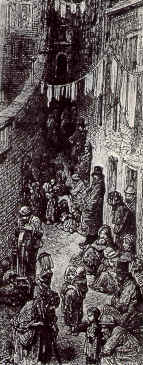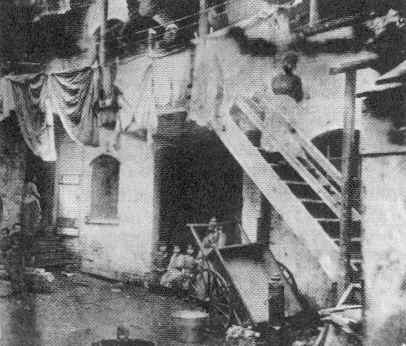

MANCHESTER
Nel brano tratto da "Jouneys to England and Irleand" di A. de Tocqueville viene descritta la situazione dei sobborghi di Manchester. La povera gente abita in case miserabili allineate lungo strade molto strette, sotto le quali vi sono cantine abitate da 12-15 persone. Vicino a queste abitazioni sono presenti fabbriche in grande quantitą e lo smog da loro prodotto forma una nebbia che non permette ai raggi del sole di passare. I rumori disturbano pesantemente la vita degli operai che vivono in condizioni igieniche pessime. Ecco proposto un brano in inglese che descrive proprio la situazione critica che si era venuta a delinerae nell'emergente cittą inglese.


Scorci di vita di cittą.
Overshadowed on every side by immense workshops, stretches marshy
land which widely spaced ditches can neither drain nor cleanse. Narrow, twisting roads
lead down to it. They are lined with one-story houses whose ill-fitting planks and broken
windows show between poverty and death. None-the-less the wretched people living in them
can still inspire jealousy of their fellow-beings. Below some of their miserable dwellings
is a row of cellars to which a sunken corridor leads. Twelve to fifteen human beings are
crowded pell-mell into each of these damp, repulsive holes.
Look up and all around this place and you will see huge palaces of industry. You will hear
the noise of furnaces, the whistle of steam. These vast structures keep air and light out
of the human abitations which they dominate; they envelope them in perpetual fog; hereis
the slave, there the master; there is the wealth of some, here the poverty of most; there
the organised rfforts of thousands produce, to the profit of one man, what society has not
yet learnt feeble and helpless even than in the middle of a wilderness.
A sort of black smoke covers the city. The sun seen through it is a disc whitout rays.
Under this half-daylight 300.000 human beings are ceaselessly at work. A thousand noises
disturb this dark, damp labyrinth, but they are not at all the ordinary sounds one hears
in great cities.
The footsteps of busy crowd, the crunching wheels of machinery, the shriek of steam from
boilers, the regular beat of the looms, the heavy rumble of carts, those are the noises
from which you can never escape in the sombre half-light of this street.
Crowds are ever hurrying this way and that in the Manchester street, but their footsteps
are briesk, their looks preoccupied, and their appearance sombre and harsh.